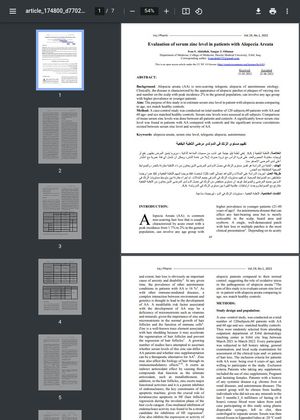TLDR People with Alopecia Areata often have lower zinc levels, and more hair loss is linked to even lower zinc levels.
This study aimed to evaluate serum zinc levels in patients with Alopecia Areata (AA) compared to healthy controls. Conducted as a case-control study with 120 subjects (60 AA patients and 60 age- and sex-matched healthy controls), it found that patients with AA had significantly lower serum zinc levels than the controls. Additionally, there was a significant inverse correlation between serum zinc levels and the severity of AA, suggesting that lower zinc levels may be associated with more severe cases of AA.
52 citations
,
July 2015 in “International Journal of Dermatology” Patients with alopecia areata have lower zinc levels, and zinc supplements might help.
 148 citations
,
December 2018 in “Journal of autoimmunity”
148 citations
,
December 2018 in “Journal of autoimmunity” Alopecia areata is an autoimmune disease causing patchy hair loss, often with other autoimmune disorders, but its exact causes are unknown.
 4 citations
,
November 2018 in “JAAD case reports”
4 citations
,
November 2018 in “JAAD case reports” Alopecia areata can sometimes appear as a straight line of hair loss instead of round patches.
May 2018 in “Journal of cosmetology & trichology” Combining platelet-rich plasma therapy with prostaglandin-F eye drops can significantly regrow hair in alopecia universalis.
110 citations
,
December 2013 in “The journal of investigative dermatology. Symposium proceedings/The Journal of investigative dermatology symposium proceedings” Alopecia areata is a genetic and immune-related hair loss condition that is often associated with other autoimmune diseases and does not typically cause permanent damage to hair follicles.


